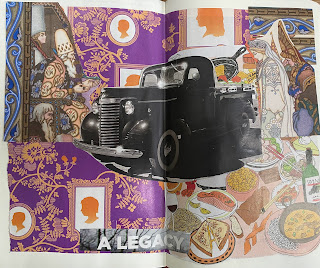100 days of dialogue!
 |
| Photo by Priscilla Du Preez on Unsplash |
I've been writing about expressive arts therapy. My goal has been to articulate a critical perspective on expressive arts therapy, but as usual, writing is never easy, and I feel pretty alone in the writing process. I like to write (sort of). I like to read (definitely!). And I know there is a connection between the two.
For me, research, theorizing, and critical reflection are not only for me. Although I do enjoy the process of playing with ideas, writing (and by extension teaching and practice) for me is my work - my attempt to be part of a future building and change process that is done in community! I've been feeling a bit bereft of community, so here is my attempt to build community and be in dialogue.
In the introduction to Mary Watkins' (2019) book, Mutual Accompaniment and the Creation of the Commons, George Lipsitz describes Toni Cade Bambara's description of transformation and change as a process of "seceding from the dominant norms and values of the self-centered, materialistic, and aggressively competitive society in which she had been raised" and of her quest to seek out "teachers at every turn" (p. xi). Engaging in this process, I have also found myself questioning and looking for teachers at every turn. Bambara (2000/1980) writes in her essay, What it is I think I'm doing anyhow, "Writing is one of the ways I participate in the struggle - one of the ways I help to keep vibrant and resilient that vision that has kept the Family going on" (p. 154). I love this. I too am hoping to use this process of writing as a practice of resilience and of participation in the struggle for social justice.
I always tell my students to think of the articles and texts we read and what we write as contributions to a larger community of scholars. However, over the past few years, I've been rethinking the notion of "scholars." Is this one of those dominant norms and values I need to question? We know that there have been voices ignored, unattended to, and marginalized in our scholarship.
When I was doing my doctoral work, my mentor Anne Alonso, emphasized that we were "entering the academy" and that our work was "scholarship." Coming from a lower working class family, the first in my family to go to college - I had no concept of "the academy" and I certainly didn't feel I knew anyone or saw anyone familiar there. Now after 25 years of teaching in higher education, I have some serious questions about what this idea of "knowledge production" means, and more specifically, about my privilege and responsibility, in this regard.
bell hooks (1991), in her essay, Theory as Liberatory Practice, writes powerfully about "the privileged act of naming" and says,
Indeed, the privileged act of naming often affords those in power access to modes of communication that enable them to project an interpretation, a definition, a description of their work, actions, etc. that may not be accurate, that may obscure what is really taking place. (p. 3)
As I write, try to interpret, define, and describe the theory and practice of expressive arts therapy. I know that this work cannot be done alone. I must be in conversation with the voices at the margin of this work - I must reach towards theory's potential to be healing, liberatory, and revolutionary, as hooks describes.
So, here I go - I am committing to 100 days of dialogue starters! 100 days of my dialogues with the writers in our field, with other writers, and with my memory of conversations with clients, students, the world! Jump in. Leave a comment!
hooks, b. (1991). Theory as liberatory practice. Yale Journal of Law and Feminism, 4(1), 1-13.


Comments
Mitchell